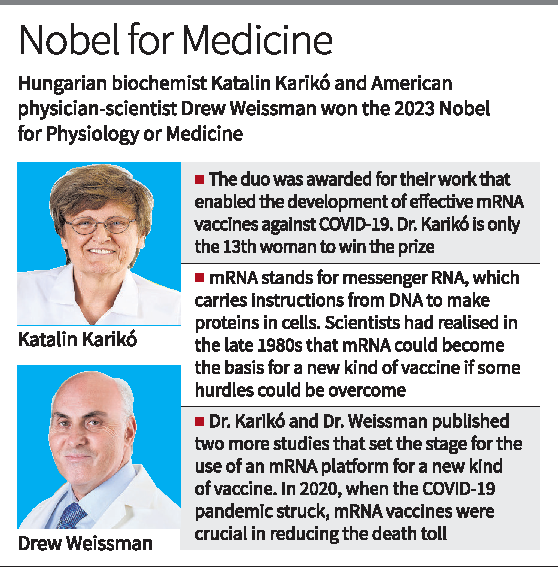
Disclaimer: Copyright infringement not intended.
Context
Dr. Karikó and Dr. Weissman were awarded the Nobel Prize for their “discoveries concerning nucleoside base modifications that enabled the development of effective mRNA vaccines against COVID-19”.
Details
- mRNA Vaccines: mRNA stands for messenger RNA, a type of nucleic acid carrying genetic information. mRNA vaccines, such as those developed by Pfizer/BioNTech and Moderna for COVID-19, differ from traditional vaccines. Instead of using weakened or inactivated viruses, mRNA vaccines introduce a piece of genetic material corresponding to a viral protein, typically the spike protein found on the virus's membrane.
- Safety Advantages: mRNA vaccines offer safety advantages as they contain only the genetic elements necessary for expressing the encoded protein. They do not expose individuals to the live virus.
- Rapid Advancements: The development of mRNA vaccines was significantly accelerated by the urgency of the COVID-19 pandemic. Within a short period, advancements in mRNA technology allowed for the successful creation of effective vaccines.
- Storage and Stability: mRNA is fragile and needs to be protected from degradation. It is wrapped in a layer of lipid or fat molecules to maintain its integrity. mRNA vaccines, however, require ultra-low temperature storage, making distribution and logistics more challenging compared to some other vaccines.
- Flexibility and Adaptability: One advantage of mRNA and DNA vaccines is their adaptability. The genetic code can be quickly updated to target emerging variants, and these platforms have the potential to be used for various diseases.
- Comparison with Viral Vector Vaccines: mRNA vaccines, like those from Moderna and Pfizer, differ from viral vector vaccines, such as Covishield. Viral vector vaccines use DNA wrapped in another virus, whereas mRNA vaccines provide instructions to the cells to produce the spike protein directly.
- Future Potential: The success of mRNA vaccines has inspired researchers worldwide to explore mRNA and DNA-based methods for developing vaccines against various diseases, including those in India.

What is mRNA (Messenger RNA)?
Messenger RNA (mRNA) is a type of ribonucleic acid (RNA) molecule found in cells. It serves as an essential intermediary in the process of protein synthesis. The central role of mRNA is to carry genetic information from DNA (deoxyribonucleic acid) to the ribosomes, the cellular machinery responsible for assembling proteins.
Function of mRNA
- Transcription: The process begins in the cell's nucleus, where DNA contains the genetic code for making proteins. During transcription, a specific segment of DNA is copied into a complementary mRNA molecule. This mRNA copy carries the instructions for building a particular protein.
- Translation: The mRNA molecule exits the nucleus and enters the cytoplasm, where ribosomes "read" the mRNA's genetic code. Ribosomes use this code to string together amino acids in the correct order, ultimately forming a protein.
- Protein Synthesis: The sequence of nucleotides in the mRNA molecule determines the sequence of amino acids in the resulting protein. This process is fundamental to the functioning of all living organisms, as proteins perform numerous critical functions in cells, tissues, and organs.
Role of mRNA in Vaccines
Traditional vaccines often use weakened or inactivated forms of the pathogen (virus or bacterium) to stimulate the immune system. In contrast, mRNA vaccines work differently:
- Genetic Code: mRNA vaccines introduce a piece of synthetic mRNA that contains the genetic instructions to produce a specific viral protein, usually the spike protein found on the surface of the virus.
- Immune Response: Once the mRNA is delivered into the recipient's cells, the cells follow the instructions and synthesize the viral spike protein. This protein is harmless on its own but mimics the presence of the virus, eliciting an immune response.
- Antibody Production: The immune system recognizes the spike protein as foreign and generates antibodies against it. These antibodies are specific to the viral protein and are primed to neutralize the actual virus if encountered in the future.
- Memory Cells: In addition to antibodies, mRNA vaccines stimulate the production of memory cells, which "remember" the spike protein. This memory response provides long-term immunity, protecting against future infections.
Advantages of mRNA Vaccines
- Speed: mRNA vaccine development is faster than traditional methods because it doesn't require growing and inactivating viruses or bacteria.
- Customization: The genetic code in mRNA vaccines can be easily modified to target different viral strains or variants, making them adaptable to emerging threats.
- Safety: mRNA vaccines do not contain live or weakened viruses, reducing the risk of causing the disease they protect against.
- Efficiency: These vaccines tend to provoke a robust immune response, often resulting in high efficacy.
- Versatility: mRNA technology has the potential to be applied to various infectious diseases and even cancer treatment.
Challenges and Storage
One notable challenge with mRNA vaccines is their storage requirements. They need to be kept at extremely low temperatures to remain stable. This necessitates special storage and distribution logistics, especially in regions with limited access to ultra-cold freezers.
.jpg)
Conclusion
mRNA vaccines represent a revolutionary approach to vaccination. They harness the body's natural protein synthesis machinery to stimulate immunity against specific pathogens. Their success, as recognized by the Nobel Prize, marks a significant milestone in the field of immunization and offers promise for addressing various health challenges in the future.
Overall, the Nobel Prize awarded to Katalin Karikó and Drew Weissman acknowledges their groundbreaking work in the development of mRNA vaccines, which played a pivotal role in the fight against the COVID-19 pandemic and hold promise for future vaccine development.
|
PRACTICE QUESTION
Q. Discuss the significance of mRNA vaccines in the context of infectious disease control and vaccination strategies. (150 Words)
|




